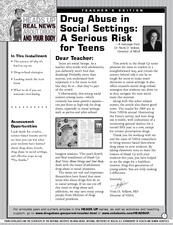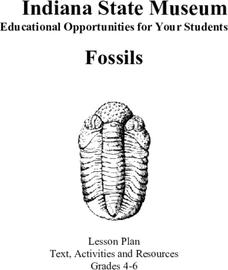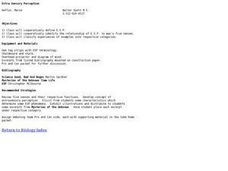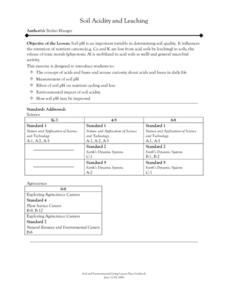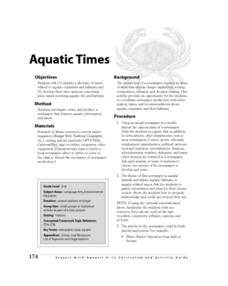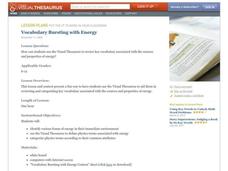Scholastic
Drug Abuse in Social Settings: A Serious Task for Teens
Students discuss why drug abuse risk is higher in social settings. In this health science lesson, students interpret real life statistics on teen drug use. They describe refusal and prevention strategies.
Curated OER
Journey To the Unkown
Learners explore the ocean rift habitat off the Galapagos through an audio expedition, Internet research on deep sea animals, an explorer game and simulation of the exploration of the deep sea bottom. They focus on the actual NOAA...
Curated OER
Human Body Basics
In this human body activity, students are given clues to find hidden words in boxes. Topics include the human body systems, the components of living things and the building blocks of life.
Curated OER
Fossils
Students complete a unit on fossils. They read and discuss informational handouts, define key vocabulary terms, answer discussion questions, create a geologic timeline and a timeline of their own life, analyze bones, and create a fossil...
Curated OER
Stella the Swan
Students analyze the telling of a story with props. They study similarities and differences between ducks, geese and swans, how wildfowl are adapted to life in water, how wildfowl move and feed, and wildfowl family life, how they nest,...
Curated OER
Extra Sensory Perception
Middle schoolers define extra sensory perception. In this science lesson plan, students identify the relationship of E.S.P. to man's five senses and classify experiences of examples into respective categories.
Curated OER
Forest In A Jar
Tenth graders are introduced to the process of succession and gain awareness of the changing nature of ecosystems. They demonstrate a comprehension of the dynamic nature of ecosystems, including the relationship between ecological...
Curated OER
Soil Acidity and Leaching
Students are introduced to the concept of acids and bases and arouse curiosity about acids and bases in daily life. They are introduced to the measurement of soil pH. Pupils are introduced to the effect of soil pH on nutrient cycling...
Curated OER
Round and Round-The Water Cycle
Students explore the water cycle. In this earth science activity, students work in small groups to read various books on the water cycle and take notes on chart paper. Students share their notes and teach a younger audience what they...
Curated OER
Introduction to Ocean Grazers
Students explore biology by creating a poster with classmates. In this oceanography instructional activity, students identify the importance of coral reefs to the ocean's ecology and examine a food web of ocean animals. Students define a...
Curated OER
Evaporation
Fourth graders study the water cycle and the different processes involved, specifically evaporation. They explore the processes of evaporation through hands-on collaborative activities and relate learning to life through...
Curated OER
An Emerald Place
Students discover four layers of the rain forest and identify the life of animals at each level.
Curated OER
Aquatic Times
Students identify a diversity of issues related to aquatic organisms and habitats and develop their own opinions concerning some issues involving aquatic life and habitats. They investigate, write and produce a newspaper that features...
Curated OER
Postcards From Mars
Fifth graders research and explore what life would be like for human colonists on Mars. They explore various websites, read and discuss newspaper articles, develop a chart of the hardships and conditions that would be faced by colonists...
Curated OER
Introduction to Engineering Information Technology
Students demonstrate knowledge of information sharing skills by discussing each step with their group members. They demonstrate application of information sharing skills by working with a group to share specific pieces of data with...
Curated OER
Fossil Inferences
Fourth graders use their knowledge about fossils to arrange fossil pictures in sequence from oldest to youngest. They explain how fossils can be used to make inferences about past life, climate, geology, and environments and discover...
Curated OER
Keep In Touch: Communications and Satellites
Fourth graders explore communications by reading assigned space science text. For this satellite lesson, 4th graders identify the concept of orbiting and examine gravitational pull by viewing diagrams. Students are assessed based on...
Curated OER
Introductory Game, Consumed
Students play a board game that reviews the basic areas of family and consumer sciences. They follow the directions found in the space on which he/she lands. Play continues until someone has consumed all of the family and consumer...
Curated OER
Physics of Sound: How We Hear Sounds
Second graders identify the different function and parts of the ear. In this physics lesson, 2nd graders explain how we hear sound. They read about the life of Helen Keller and respond to questions that follow.
Curated OER
The History of Climate Change
In this science worksheet, students gather in-depth information dealing with climate change over the next century. They analyze the grid to determine the average time difference between peaks in the temperature history for the last...
Curated OER
Keeping our Water Clean
Second graders discuss how our actions impact the quality of water. For this environmental science lesson, 2nd graders watch a short film and discuss the problem of polluted water. Students are then divided into groups and record their...
Curated OER
Tadpole Diary
Second graders examine the life cycle by observing tadpoles. After reading the book, Tadpole Diary, they draw the stages of tadpole development and write sentences about what they think is happening.
Curated OER
Kinetics
In this kinetics worksheet, learners answer a variety of questions. They find reaction rates, determine the order of reactions and they determine rate constants. They calculate the half-life for reactants and they answer questions about...
Curated OER
Vocabulary Bursting with Energy
Young scholars review key physics terms using a Visual Thesaurus. In this science lesson, student groups compete against each other to correctly identify "imposter" words from a list of related physics vocabulary terms.
